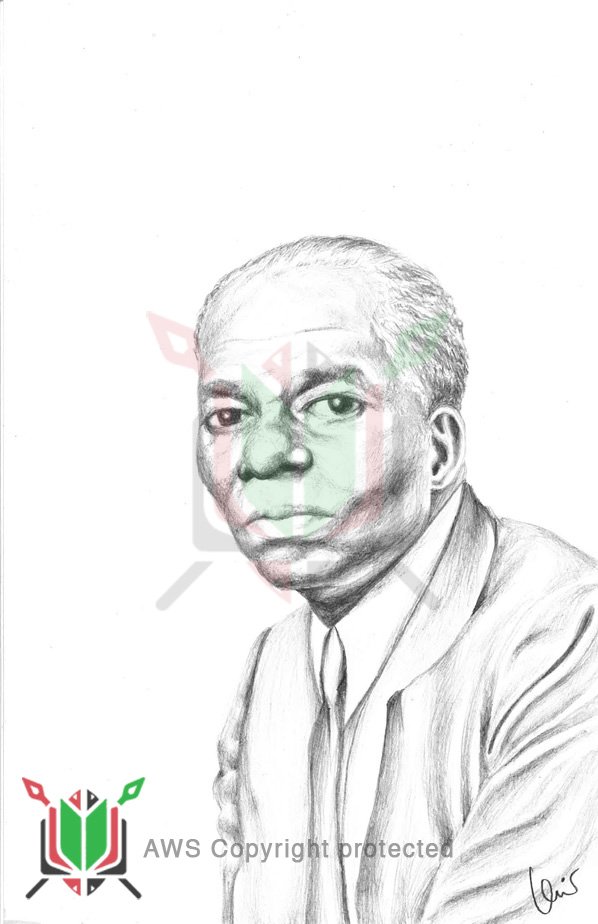
Dr. John Henrik Clarke(1915 -1998)
Historian, Lecturer, philosopher, writer, Pan Africanist
he was born John Henry Clark on January 1, 1915, in Union Springs, a small farming community in Alabama and died Dr John Henrik Clarke in Mount Sinai, New York, July 16,1998. John Henrik Clarke was not destined to become a small farmer as his parents thought, he beat the odds to become a stalwart in the genre of African History and education. At 18 years of age he hightailed it out of Alabama, hopped a freight train to New York, where he not only changed his name but changed his expectations and his destiny.
Education and Career
Joining the migration of rural black youths from the South to the more hospitable cities towards blacks in the North, John Henry headed to Harlem, New York, where he changed his middle name to Henrik in honor of his literary hero, noted European playwright Henrik IBsen ( A Doll’s House, Peer Gynt fame). He also modified the spelling of his last name by adding an “e” to the end making it Clarke.
Dr Clarke elevated himself from the son of a sharecropper and a washer woman to become the founder and chairman of the Department of Black and Puerto Rican Studies at Hunter College, City University of New York from 1969 to 1986. He was the recipient of the Carter G. Woodson Medallion for Distinguished Visiting Professors of African History at Cornell University Africana Studies and Research Center 1986. In 1968 he founded the African Heritage Studies Association from which evolved the Black Caucus of The African Studies, another of his brainchild. At the age of 77 years in 1992 he earned a bachelor’s degree from Pacific Western University and went on to 2 years later to acquire his doctorate from said university (renamed California Miramar University) in Los Angeles in 1994 at the age of 79 years.
Realizing that not only the damaging effects of World War 1 on the economy in rural communities but other demographic changes had resulted in an influx of African Americans in Harlem, Clarke aligned himself to groups from which he could garner some sort of education, regardless of how unorthodox it may seem at that time. An unwritten coalition had been formed among the varying professionals who resided in that section of the city and he made full use of what was being freely offered then to launch his career. He joined intellectual groups as the Harlem History Club, Harlem Writer’s Workshop, the League of Professional Writers, he also attended New York University, Columbia University and Hunter College aperiodically based on his finances or scholarships that he pursued voraciously.
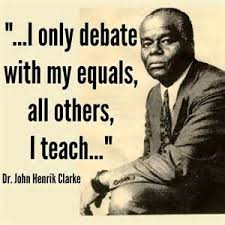
With his penchant for joining groups combined with a natural instinct to learn more about his people, it is not surprising that he played an integral role in the Black Power Movement in the late 1960’s. He was also one of the pioneers in the establishment of the Pan African Movement. Challenging the way African History was taught, Dr Clarke advocated for the study of African-American cultural,economical and social experience, insisting that Africans be aware of their authentic place in World History and not the distorted version that was being propagated and taught by europeans.
Religion
The origin of every religion have their roots in Africa. Catholicism, Christianity, Islam, all originated in Africa. Even Rastafarianism, although made popular by Robert Nesta Marley, a Jamaican native, has its roots in Africa and Dr John Henrik Clarke is one, if not the most knowledgeable Black speaker on religion as it affects the African people and their culture.
Whoever is in control of the hell in your life, is your devil. Excerpt from the book: Christopher Columbus and the Afrikan Holocaust- Dr. John Henrik Clarke 1992
This opening quote is a clear indication of Dr. Clarke’s stance on religion. There are several other quotes on european religious conceptualization that cannot be ignored once one has been exposed to this eminent scholar thought provoking views. It doesn’t matter how ardent a supporter of the “white man’s” God you are, this eloquent orator, without any inflection of threat or coercion in his voice compels you to question the traditional religious texts. After reading Dr. Clarke’s works or listening to his speeches particularly those on the three major religions, it will be difficult to accept without questioning the veracity of Christianity as outlined in the Bible.
Challenging the ethnicity of Jesus Christ as purported by Europeans,in the Holy Bible may constitute blasphemy to the converted or believers in the european deity. While not condemning the Bible, Dr. Clarke stipulated that one should not believe everything that one reads as there are contradictions and parts thereof that was written to assist in the submission of Africans so as to make them more malleable to their slave masters. Afterall, they had not the capacity to totally destroy the Africans. Arguably, they could beat them, work them, starve them into submission but they could not break their inner strength.
He expressed his belief that Christianity was the stratagem of european imperialism, Islam is the instrument of Arab Imperialism, while the Hebrew faith was the contivance of (fostering belief in) a chosen people. On the authority of Dr. John Henrik Clarke, Africa has been under attack for 3,000 years. He rationalizes his religious perspectives on the hypothesis that “if God is kind and God is merciful and has no stepchildren, won’t choose one over the other.” Dr Clarke is of the view that if God chose some people over the others God would be a “bigot.” He postulated that whatever came from the outside was not meant to benefit but to “ lay siege” to the African people. He stated that if one believes that God endorsed slavery, it would be like making God an accessory to murder. Some may think this blasphemous but this signifies his deep religious beliefs. The God he believes in is one that is kind, merciful, and has no bias. By virtue of his religious convictions, his pragmatic perspective on the predicament of the African people and the root of their problems, Dr. Clarke is viewed as a black radical by many europeans. He intimated that the three major world religions; Christianity, Islam and Judaism (referred to by him as the Hebrew Faith) have in some way impacted the Africans negatively.
This self explanatory quote sums up his religious views perfectly: I have no romance with religion, I have no romance in any of them.I have romance with the truth and reality and the chips may fall wherever they lie!”
John Henrik Clarke Quotes
To use a hackneyed term, John Henrik Clarke had a way with words. With popular quotes as: “I only debate my equals, all others I teach; and “Racists will always call you a racist when you identify racism. To love yourself now is a form of racism. We are the only people who are criticized for loving ourselves, and the white people think that when you love yourself, you hate them. No, when I love myself they become irrelevant to me” The concept of a black man rising to the level where he does not only think and write such thoughts, but has the temerity to articulate them publicly must have resulted in some deep introspection for the white man. Instead of thinking that they got something right, they may have been ruminating over what went wrong on their part. Basically to the europeans, the African people are supposed to be barbaric animals to be beaten and trampled at all times in order to keep them docile. As an African-American Dr Clarke had the effrontery to not only openly express himself as their equal but the presumptuousness to imply that he can also teach them must have been a bitter pill to swallow. Aside from the pigmentation of his skin, no explanation is needed as to why such a scholar is not more recognized in european literary circles. He was not willing to remain a slave to the european stigmatization of the black African male. .
What did the europeans expect from a man who believes that : “The African man is the greatest fighting machine God ever created” and that, “to be black and beautiful means nothing in this world unless we are black and powerful.” Indeed, this is a man who never had a thought of capitulating to the european classification of Africans as a minority. He did not fit into the mold of the African that the white man had cast.
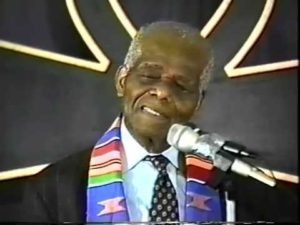
Not having powerful vocals did not lessen the impact of John Henrik Clarke’s oratories. Not one to restrain himself from voicing his concepts or edulcorate his opinions to make them more acceptable, his speeches are generally peppered with profound quotes that not only stimulate the mind but at times are also quite humorous. Easily one of the most eloquent yet soft spoken speakers of all times, one cannot but admire the profundity of many of his statements. Powerful People cannot afford to educate the people they oppress, because once you are truly educated, you will not ask for power. This quote on education is so profound that there are many scholars who have difficulty analyzing or comprehending the concept. He stipulated that African people have no friends as; “Nothing from the outside brought into Africa was meant to do them any good. He went on to give his explanation of this pronouncement: The Arabs used Islam to rationalize their slavery and imperialism, The europeans used christianity to rationalize their slavery and imperialism. Who are you kidding about friends in the world? —If you want a friend, look in the mirror! There is a billion African people in the world. Why are we buying third rate junk from third rate people thinking that you can’t make it?
Books
Author of several books on Black History, Black Culture, Black Identity, Dr John Henrik Clarke sought to revive African pride and culture which were almost obliterated during slavery. His book: Columbus and the Afrikan Holocaust -Slavery and the Rise of European Capitalism – 1992, Dr. Clarke not only identified where and when the dissolution of the African people began but also who prolonged and benefited from the dissipation.of its resources. An admirable trait of Dr. Clarke and other Pan Africanists as Dr. Amos Wilson, Marcus Garvey, Dr Ben Jochannan to name a few, is that they not only identify the problem, they offer solutions. Although totally blind in his latter years, he not only continued to lecture but managed to write several books before his death in 1998.
Who Betrayed the African World Revolution? This is no ordinary question. It is the title of a book featuring a collection of fiery, no-holds-barred speeches by Dr. Clarke. Written in 1994, Dr Clarke was fearless and laid the blame on everyone whom he thought contributed to the destitution of the African people including the Africans themselves.
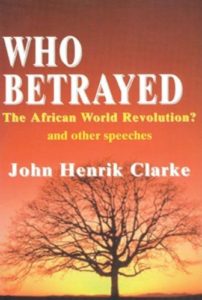
John Henrik Clarke travelled extensively not only to verify what he had already discovered about his people but also to unearth, to demystify and to fraternize with Africans outside of America. This enabled him to gain in depth perspectives on Africans throughout the diaspora which resulted in another book: My Life in Search of Africa. Dr Clarke also co-wrote a book on Marcus Garvey (the forerunner of the promotion of African unity inside the diaspora).
Africans at the Crossroads: Notes for an African World Revolution, one of his early works is combined from a collection of essays he researched and wrote in 1991. This collection and all his works are quite readable, short, concise essays and should be a part of any notable African historical collection.
Summary
Dr John Henrik Clarke was an exceptional African American who broke family tradition at age 18 when he migrated from a small, rural farming community in Alabama to Harlem New York where he had no relatives or friends previously. A self-made man who alternated between working and the pursuit of knowledge of his ancestors, rose above his peers to become one of the most prolific speaker and writer on African culture, economy, and people. His unapologetic criticism of the european insurgence into Africa and its devastating effects are well documented. Never subordinating to the european culture and refused to be hushed he spent his life trying to revive the consciousness of the African people through his writings, lectures and speeches. He exited this world in 1998, a new state of the art library wing at —- was named in his honor. Although he was born in the USA, he endeared himself to Africans all over the globe.
In the words of Dr John Henrik Clarke: “It’s time for black people to stop playing the separating game of geography, of where the slave ship put us down. We must concentrate on where the slave ship picked us up.” “Africans in in the Americas must remember that the ships brought no West Indians, no Caribbeans, no Jamaicans or Trinidadians or Barbadians to this hemisphere.The slave ships brought only Africa people and most of us took the semblance of nationality from the places where the slave ships dropped us off.”
African people should not only be aware of where they are but should know their origin.
We hope that you found the information above interesting and informative. All of the content used on our website is original and created especially for the educational uplifment of our visitors. This includes our images such as the sketch you see above created exclusively for our website. Please visit our online store to purchase items commemorating the great honorable John Henrik Clarke and other African Warrior Scholars. Thank you for visiting!
Abibifahodie,
The AWS Team
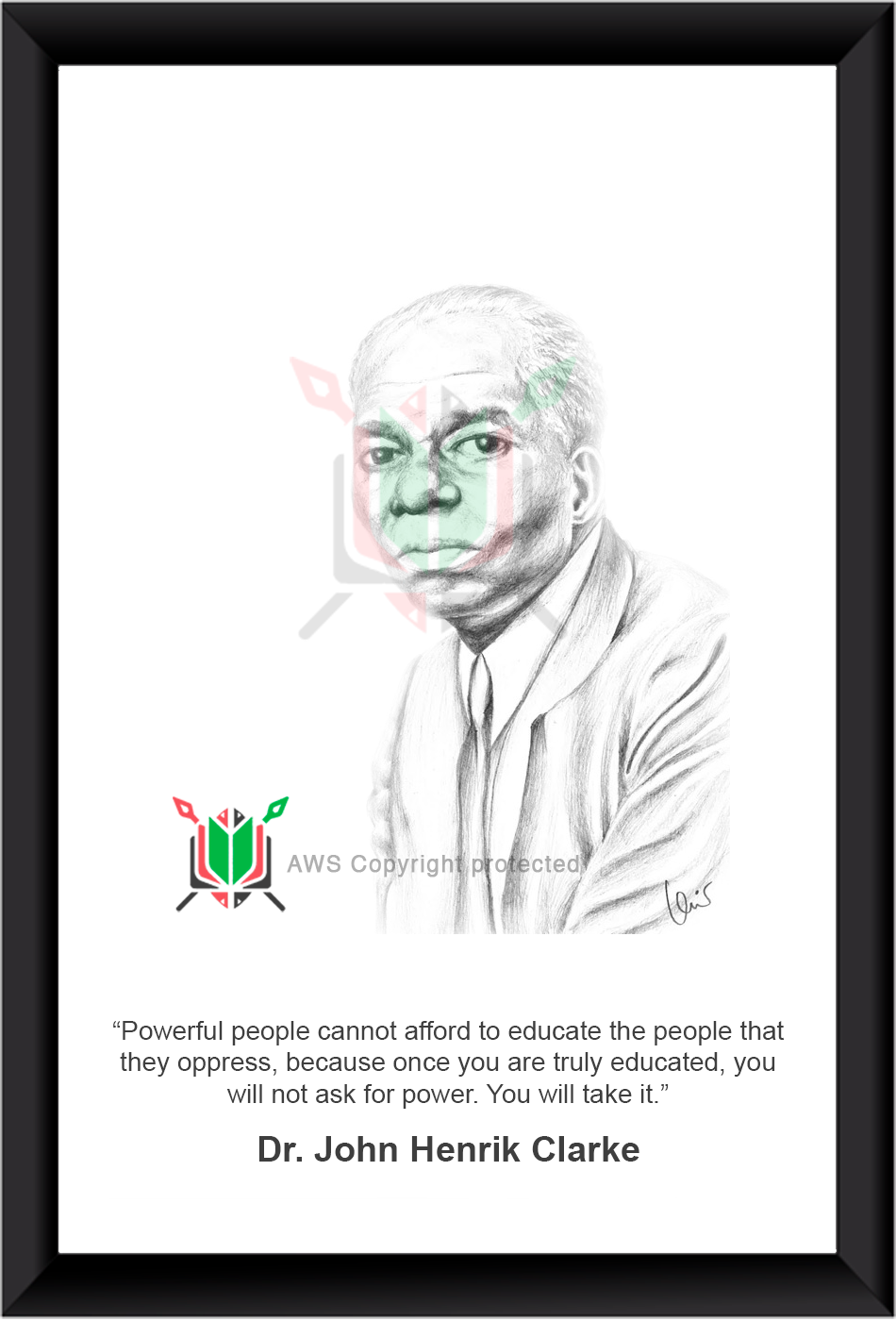
Dr. John Henrik Clarke Custom Quote Sketches
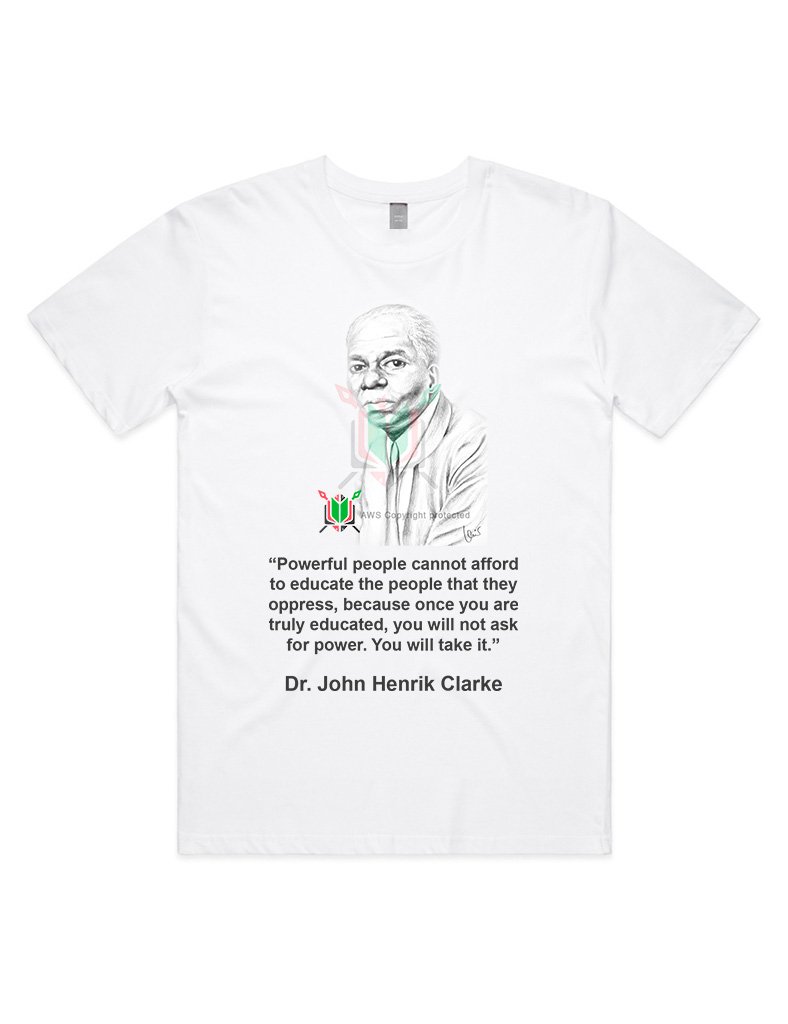
Dr. John Henrik Clarke Custom Quote T-Shirts

